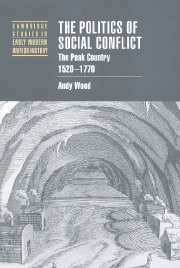Book contents
- Frontmatter
- Contents
- List of figures
- List of tables
- List of maps
- Preface
- List of abbreviations
- Introduction ‘Terms we did not understand’: landscape, place and perceptions
- 1 Social relations and popular culture in early modern England
- Part I The structures of inequality
- Part II The conditions of community
- Part III The politics of social conflict
- 9 ‘Pyllage uppon the poore mynorz’: sources of social conflict, 1500-1600
- 10 ‘All is hurly burly here’: local histories of social conflict, 1600-1640
- 11 The peak in context: riot and popular politics in early Stuart England
- 12 ‘Prerogative hath many proctors’: the English Revolution and the plebeian politics of the Peak, 1640–1660
- 13 The experience of defeat? The defence of custom, 1660–1770
- 14 The making of the English working class in the Derbyshire Peak Country
- Bibliography
- Index
- Cambridge Studies in Early Modern British History
12 - ‘Prerogative hath many proctors’: the English Revolution and the plebeian politics of the Peak, 1640–1660
Published online by Cambridge University Press: 27 July 2009
- Frontmatter
- Contents
- List of figures
- List of tables
- List of maps
- Preface
- List of abbreviations
- Introduction ‘Terms we did not understand’: landscape, place and perceptions
- 1 Social relations and popular culture in early modern England
- Part I The structures of inequality
- Part II The conditions of community
- Part III The politics of social conflict
- 9 ‘Pyllage uppon the poore mynorz’: sources of social conflict, 1500-1600
- 10 ‘All is hurly burly here’: local histories of social conflict, 1600-1640
- 11 The peak in context: riot and popular politics in early Stuart England
- 12 ‘Prerogative hath many proctors’: the English Revolution and the plebeian politics of the Peak, 1640–1660
- 13 The experience of defeat? The defence of custom, 1660–1770
- 14 The making of the English working class in the Derbyshire Peak Country
- Bibliography
- Index
- Cambridge Studies in Early Modern British History
Summary
WAR AND ALLEGIANCE
Modern historians have found the Peak miners as difficult to understand as did their early modern rulers. In an economy which is conventionally described as pre-industrial, the lives of the mining workforce were dominated by the experience of industrial labour. In a society whose norms were supposedly built upon the reciprocal ideals of plebeian deference and elite patronage, the miners stand out as unusually assertive. It should therefore come as no surprise to find that popular allegiances in the Peak at the outbreak of the first civil war run against the grain of the contending historical explanations of that subject. The political loyalties of the miners and tenants of the area did not follow those of the local gentry and nobility. Popular deference to the political decisions of their social betters can therefore be ruled out. Neither did the miners enlist as a composite social bloc for one side or another, thereby frustrating a simple class interpretation of allegiance. The same goes for suggestions that religion constituted the key factor in individuals' and groups' choice of sides. While religion proved a motivating factor for some people within the Peak, religious divisions were not as deep as elsewhere within England. Instead, the plebeian inhabitants of the Peak followed their own circuitous and divergent paths into civil war.
- Type
- Chapter
- Information
- The Politics of Social ConflictThe Peak Country, 1520–1770, pp. 267 - 294Publisher: Cambridge University PressPrint publication year: 1999



